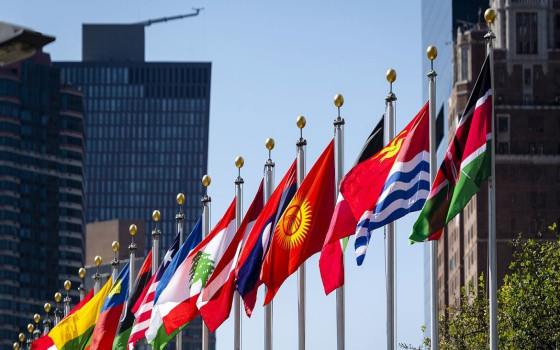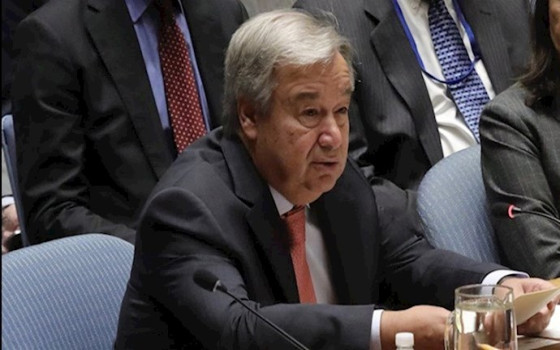The UN Secretary-General unveils a "new peace plan" that promotes sustainable development

- Europe and Arabs
- Sunday , 23 July 2023 18:6 PM GMT
New York - Brussels: Europe and the Arabs
According to the latest news bulletin issued by the United Nations over the weekend, the Secretary-General of the United Nations launched a "new peace agenda" that promotes sustainable development
The Secretary-General of the United Nations launched a policy brief titled "A New Agenda for Peace", which included his vision of multilateral efforts for peace and security based on international law at a transitional moment in the world.
Antonio Guterres said the new policy brief is centered around "the key principles of trust, solidarity and universality which lie at the heart of the UN Charter and the establishment of a stable world".
He added that the policy brief is part of his commitment to link work for peace with the goals of sustainable development, saying, "If we achieve the vision that we set for the 2030 Agenda, our world will become more peaceful, secure and sustainable."
Guterres made it clear that the new era that we are now living in is marred by the highest levels of geopolitical tension and competition between major powers for decades, and that member states are now questioning the feasibility of the multilateral system for them. Violations of international law have also become more widespread.
He also noted that conflicts have become more complex, deadly and more intractable, "as we saw last year the highest number of conflict-related deaths in the world in three decades."
He also said that climate emergencies have heightened competition for resources and raised tensions, as well as Russia's invasion of Ukraine, which has made meeting those challenges more difficult.
Prevention and response to risks and divisions
In his policy brief, the Secretary-General proposed 12 actions among five key recommendations. The first recommendation is global prevention by addressing strategic risks and geopolitical divisions.
Guterres said that reducing the existential threat posed by nuclear weapons is an urgent priority, but it is not sufficient, stressing the need to do everything possible to eliminate this threat through "the elimination of nuclear weapons."
The second action that falls under the first recommendation is the strengthening of preventive diplomacy in an era of divisions. He called on the Secretary-General to use the capabilities of the United Nations to bridge divisions so that humanity does not turn into a secondary wreck of the unbridled competition between the great powers.
"The United Nations, as the only global platform, should be the center of these efforts," he added.
He also said that the policy brief recommended "investing in regional security structures capable of rebuilding trust among member states and supporting diplomacy at the global level."
Prevent conflict and violence
The second recommendation is to prevent conflict and violence and to maintain peace. The Secretary-General stated that this recommendation calls for the establishment of a prevention system that addresses all forms of violence, focuses on mediation, strengthens social cohesion, and centers around the link between sustainable development, climate action and peace, and is based on respect for all human rights, including civil, political, economic, social or cultural rights.
He added that this matter requires "a comprehensive vision for the continuity of peace and an integrated approach to identify the causes of wars and prevent the scattering of their seeds," stressing the importance of accelerating the pace of implementation of the 2030 Agenda for Sustainable Development, as sustainable development and the prevention of conflicts are linked and mutually reinforcing. The policy brief also recommends transforming the dynamics of power in the field of peace and security.
The Secretary-General said that governments must take action to ensure meaningful participation and leadership of women in decision-making, to eliminate all forms of violence against women and to promote their rights.
The policy brief also calls for reducing the human cost of weapons by enhancing the protection of civilians in populated areas in conflict zones, reducing military expenditures, renewing efforts to limit conventional weapons, and increasing investment in prevention, infrastructure and social services.
Strengthening peacekeeping operations
As for the third priority included in the policy brief, it is strengthening peacekeeping operations and addressing peace enforcement issues. The Secretary-General said that United Nations peace operations embody in practice the principle of effective multilateralism, but the challenges posed by conflicts - which have been prolonged without finding their way to resolution due to complex domestic, geopolitical and transnational factors, and the asymmetry between mandate and resources - revealed the limitations faced by those missions. "Peacekeeping cannot succeed when there is no peace to keep," he added.
The policy brief suggests reflecting on the limits and future of peacekeeping in light of the changing nature of conflicts in order to be able to model more flexible, adaptable and effective missions, while formulating transition and exit strategies, as appropriate.
He also cautioned that the proliferation of non-state armed groups that operate across borders pose a significant and growing threat in several regions of Africa, as do other conflict and crisis drivers related to overlapping threats, which necessitate a new generation of peace enforcement missions and counter-terrorism operations.
Guterres spoke about the challenges facing Africa in this field, saying: "There is no continent more in need than Africa for this new generation of peace enforcement missions," reiterating his call for the formation of peace enforcement missions and counter-terrorism operations led by African partners and mandated by the Security Council, under Chapters VII and VIII of the United Nations Charter, and with guaranteed funding through assessed contributions.
Dealing with artificial intelligence
The fourth focus of the policy brief, the Secretary-General said, is preventing the weaponization of emerging technologies and promoting responsible innovation, noting that “artificial intelligence and emerging biorisks – and their interrelationship – pose a range of threats that transcend current governance frameworks.”
He noted that the Policy Brief made proposals for Member States to address the spillover of hostilities into outer cyberspace
The policy brief recommends that malicious cyber activities target essential infrastructures involved in the delivery of public services and the functioning of society, by both governmental and non-state actors.
Guterres reaffirmed his welcome to the calls of Member States, experts and scientists in the field of artificial intelligence to consider establishing an international entity to reduce the risks posed by artificial intelligence to peace and security, and reap its benefits to accelerate the pace of sustainable development.
The policy brief calls for urgent national strategies on accountability in the design, development and use of AI, consistent with Member States’ obligations under international humanitarian law and international human rights law, and to establish standards, norms and principles addressing the design, development and use of military applications of AI through a multilateral process, while ensuring the involvement of stakeholders from industry, academia, civil society and other sectors.
Strengthening international governance
The fifth recommendation included in the policy brief is related to strengthening international governance, as it proposes building a more robust collective security mechanism.
The UN Secretary-General said the world needs collective security structures that reflect current geopolitical realities and the contributions that different regions make to global peace.
He touched on the political brief's proposal to carry out urgent reforms to the Security Council in order to make it more equitable and representative, and to democratize its procedures.
The policy brief also puts forward recommendations to revitalize the United Nations General Assembly, reform the disarmament machinery, and advance the work of the Peacebuilding Commission.
"In particular, the Security Council should seek the Committee's advice more systematically on the peacebuilding dimensions of peace operations mandates," Guterres said.
The Secretary-General stressed that the threats facing peace now have created new requirements, noting that the policy brief on a new peace plan "is our attempt to meet those requirements."
Two upcoming political briefs
The Secretary-General concluded his speech by talking about the two remaining political briefs within our "joint plan" for the United Nations, namely "Transforming Education" and "United Nations 2.0", which he will launch soon.
Guterres said the policy brief on transforming education proposes a comprehensive change of education systems to equip individuals and societies with new skills, capabilities and mindsets in line with "a rapidly changing world".
As for the "United Nations 2.0" policy brief, the Secretary-General presents his vision for a modernized United Nations that takes advantage of the highest skills and directions to enable member states to accelerate the pace of the 2030 Agenda for Sustainable Development.
"We intend to transform expertise into the most important areas of the 21st century, including data, digital, innovation, strategic forecasting and behavioral science," said the Secretary-General.
He added that the aim of these policy briefs is to support preparations for the Future Summit to be held next year.
It is noteworthy that the Secretary-General is issuing a series of policy briefs with the aim of providing more details on some of the proposals contained in "Our Joint Plan", a plan issued by the Secretary-General in 2012 that reflects his vision for the future of international cooperation.














No Comments Found